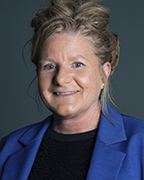Sheryl Fielding Receives Staff Award for Excellence

For the Michigan Structural Heart Consortium’s (MISHC) Clinical Quality Improvement Lead and nurse educator, Sheryl Fielding, it has been exciting to watch TAVR procedures change since the beginning of Michigan TAVR in 2015. The procedures were first performed under general anesthesia, followed by conscious sedation, and now sites are considering nurse-led sedation. Sheryl has enjoyed watching the rapid changes and improvements in the field.

Over the past couple of years, change seems to be the theme for Sheryl. She has adapted to a version change at the national STS/ACC NCDR TVT registry and welcomed new sites. Sheryl has also seen Michigan TAVR renamed MISHC with the addition of mitral procedures including mitral valve replacements and transcatheter edge-to-edge repairs, or TEER procedures. Her commitment to education and collaboration and always exemplary work performance, have recently earned her a Michigan Medicine Department of Internal Medicine Staff Award for Excellence.
Through MISHC, Sheryl supports structural heart physicians and coordinators, hospital system administrators, and registry coordinators across the State of Michigan by conducting chart reviews and site visits, developing reports and resources, and facilitating educational meetings to drive quality improvement. She also assists with special projects for BMC2’s PCI and vascular surgery and collaborates with peers at the Michigan Society of Thoracic and Cardiovascular Surgery Quality Collaborative (MSTCVS).
When the national STS/ACC NCDR TVT registry began undergoing its first version change in 10 years, Sheryl was invited to sit on the committee and provide feedback. The version change would mean new data definitions and a new data form as well as an updated website and reporting. Sheryl soon realized that the registry’s plan to include a basic data set instead of a full data set would mean that important information like radiation dose and contrast volumes would no longer be documented. These data fields are crucial to recognizing the risks for contrast-induced nephropathy and acute kidney injury which can lead to hospital readmissions and even death. Neglecting to include this information could be detrimental to patients. Sheryl discussed this omission with her colleagues at MISHC and voiced the state’s concerns to the national registry. The concerns were also discussed at a MISHC physician meeting where the state voted to collect the full data set. To prepare sites for the new version change, Sheryl and her team provided education at coordinator meetings, highlighting the areas which were changing and would require coordinators to adjust to new documentation. After the new version launched, meetings were held to discuss new and challenging data fields.
Soon after, Sheryl began receiving feedback from the sites that there were issues with the new database. Coordinators were trying to pull data for their monthly progress presentations and were not confident in doing so because the format had changed and there were no labels for procedure type. Sheryl met with Joan Michaels, director of cardiac registries at TVT, and her IT team, along with coordinators from both Beaumont and Michigan Medicine who shared how the lack of procedure type labels in the new database was causing problems. As a result, the national team changed the way they were reporting data so that it could be pulled more easily for trends and quality. “They listened to us, they took our advice, and they changed it. So, that was exciting,” Sheryl recalls.
Sheryl is in regular contact with Joan Michaels, sharing with her questions that coordinators ask, problems she finds in her chart audits, and issues that arise as a state. She is grateful for the way that Joan listens and takes MISHC’s concerns to national physician leaders. This communication has led to clarifying definitions and other changes making MISHC very involved in influencing positive change. The consortium also tries to have someone from the state involved each year at ACC, whether participating on a panel, giving a talk, or presenting a poster.
The consortium has grown considerably in the last year, adding 6 new sites for a total of 30. Sheryl has been instrumental in supporting hospitals to develop programs prior to them being eligible to become consortium members. Before McLaren added both Greater Lansing and Port Huron, Sheryl met with team members, including the CEO, to share what would be required of them to perform TAVRs at their sites. She shared with them the CMS NCD coverage document which outlines what is required to receive payment for procedures. She answered questions and helped ensure everything was in order before they began their programs. Sheryl offers valuable insight by sharing the challenges and successes of other sites, giving an inside view of what kinds of issues of their own the new sites may face.
When she noticed a gap in resources and support for mid-level providers such as physician assistants and nurse practitioners, Sheryl started Mi TVT2. The group offers educational meetings with presentations by nationally renowned speakers and opportunities for networking. Sheryl is excited by the collaboration and ideas that have resulted. A group is working on readmission prevention by looking at data to find high-performing sites and incorporating their practices for readmission prevention, discharge teaching, and safe discharge practices. Mi TVT2 hopes to publish as a mid-level group. They also plan to share what they have learned and how they are collaborating throughout the state of Michigan at a national level via the ACC summit next year.
MISHC Program Co-Manager, Annemarie Forrest, who nominated Sheryl for the Staff Excellence Award, says, “Sheryl cares deeply about her work and her colleagues. That sense of caring leads to unparalleled commitment to excellence and integrity and she is an invaluable asset to MISHC, BMC2, as well as to national TVT membership. Sheryl will be a critical player in expanding the scope of our work in the years to come.”
